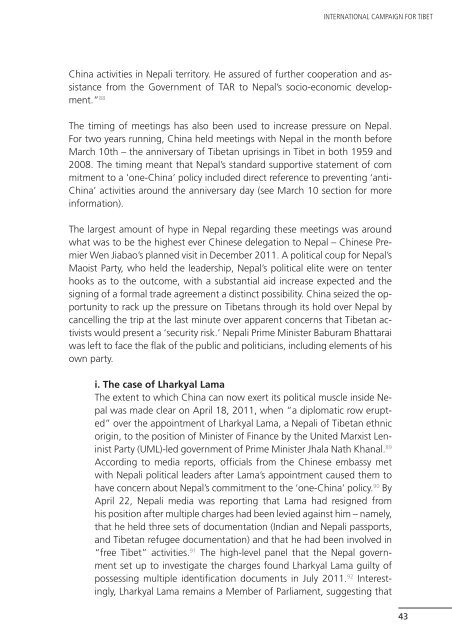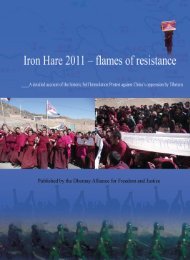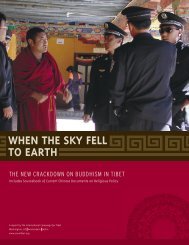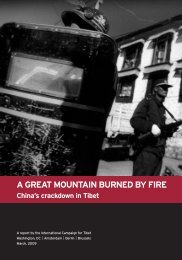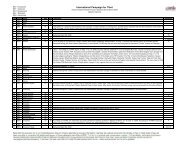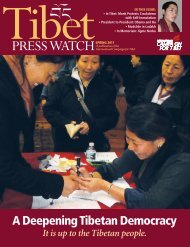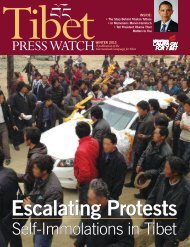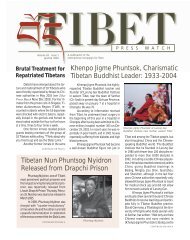DANGEROUS CROSSING: - International Campaign for Tibet
DANGEROUS CROSSING: - International Campaign for Tibet
DANGEROUS CROSSING: - International Campaign for Tibet
You also want an ePaper? Increase the reach of your titles
YUMPU automatically turns print PDFs into web optimized ePapers that Google loves.
INTERNATIONAL CAMPAIGN FOR TIBET<br />
China activities in Nepali territory. He assured of further cooperation and as-<br />
sistance from the Government of TAR to Nepal’s socio-economic develop-<br />
ment.” 88<br />
The timing of meetings has also been used to increase pressure on Nepal.<br />
For two years running, China held meetings with Nepal in the month be<strong>for</strong>e<br />
March 10th – the anniversary of <strong>Tibet</strong>an uprisings in <strong>Tibet</strong> in both 1959 and<br />
2008. The timing meant that Nepal’s standard supportive statement of com<br />
mitment to a ‘one-China’ policy included direct reference to preventing ‘anti-<br />
China’ activities around the anniversary day (see March 10 section <strong>for</strong> more<br />
in<strong>for</strong>mation).<br />
The largest amount of hype in Nepal regarding these meetings was around<br />
what was to be the highest ever Chinese delegation to Nepal – Chinese Pre-<br />
mier Wen Jiabao’s planned visit in December 2011. A political coup <strong>for</strong> Nepal’s<br />
Maoist Party, who held the leadership, Nepal’s political elite were on tenter<br />
hooks as to the outcome, with a substantial aid increase expected and the<br />
signing of a <strong>for</strong>mal trade agreement a distinct possibility. China seized the op-<br />
portunity to rack up the pressure on <strong>Tibet</strong>ans through its hold over Nepal by<br />
cancelling the trip at the last minute over apparent concerns that <strong>Tibet</strong>an ac-<br />
tivists would present a ‘security risk.’ Nepali Prime Minister Baburam Bhattarai<br />
was left to face the flak of the public and politicians, including elements of his<br />
own party.<br />
i. The case of Lharkyal Lama<br />
The extent to which China can now exert its political muscle inside Ne-<br />
pal was made clear on April 18, 2011, when “a diplomatic row erupt-<br />
ed” over the appointment of Lharkyal Lama, a Nepali of <strong>Tibet</strong>an ethnic<br />
origin, to the position of Minister of Finance by the United Marxist Len-<br />
inist Party (UML)-led government of Prime Minister Jhala Nath Khanal. 89<br />
According to media reports, officials from the Chinese embassy met<br />
with Nepali political leaders after Lama’s appointment caused them to<br />
have concern about Nepal’s commitment to the ‘one-China’ policy. 90 By<br />
April 22, Nepali media was reporting that Lama had resigned from<br />
his position after multiple charges had been levied against him – namely,<br />
that he held three sets of documentation (Indian and Nepali passports,<br />
and <strong>Tibet</strong>an refugee documentation) and that he had been involved in<br />
“free <strong>Tibet</strong>” activities. 91 The high-level panel that the Nepal govern-<br />
ment set up to investigate the charges found Lharkyal Lama guilty of<br />
possessing multiple identification documents in July 2011. 92 Interest-<br />
ingly, Lharkyal Lama remains a Member of Parliament, suggesting that<br />
43


